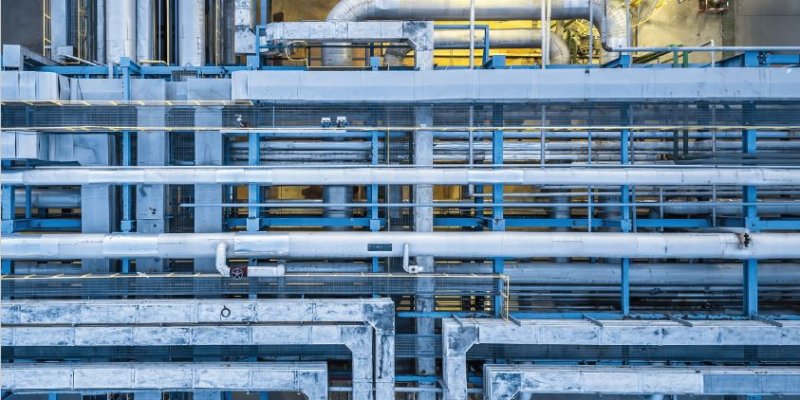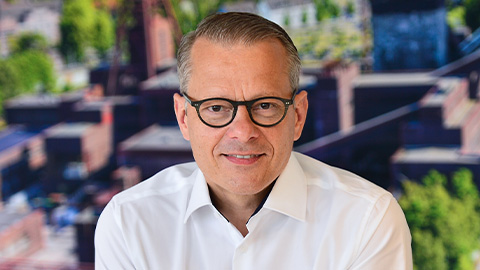

Topic of the month:
Grid fee for hydrogen core grid
Grid fee for hydrogen core grid
Bio-LNG is certainly a niche issue. For heavy goods vehicles, it is basically the only decarbonisation option currently available. But politically, this is not really wanted. Neither HGV tolls nor fleet restrictions on greenhouse gas emissions take into account the carbon neutrality of the fuel. When CH4 is burnt in the combustion engine, CO2 is emitted from the exhaust. The fact that this CO2 – or even more CO2 – was previously captured in the fuel production process is irrelevant in the tank-to-wheel calculation. Bio-LNG only counts towards the GHG quota in the transport sector. The extra money that can be earned by selling the quota is one of the reasons why individual companies are focusing on Bio-LNG. Erdgas Südwest Bio-LNG started regular operation of a liquefaction plant in April. In an interview, Philipp Machauer, the company's Commercial Director, explained a very interesting competitive situation. Biomethane can practically be liquefied into Bio-LNG in Zeebrugge. From his point of view, this is not exactly fair competition. I think it is a fascinating regulatory question whether this is the case or not. I have reported on virtual liquefaction in the past. Based on the conversation with Machauer, I have spoken informally with a number of market participants to understand the issue. Readers will find the results of these discussions and the interview in this edition.
Naturally, I have also summarised the contents of the coalition agreement relevant to the gas industry in this edition. If the SPD (Social Democrats) members vote in favour, you will also know the names of the ministers when you hold this magazine in your real or virtual hands. You can then check the accuracy of the speculation about names that I report in this issue. In the editorial of last month's issue, I wrote that Germany lacked a think tank close to the CDU (Christian Democrats) that focused on energy issues. After a few conversations, I learned that Epico Climate Innovation is a research institute in Berlin with close ties to the CDU. It was founded five years ago. The possible ‘return’ of large volumes of Russian pipeline gas and the impact of Trump's policies remain the main geopolitical issues in the gas market. Trump's tariff policy dominated gas trading in the first half of April, as reported.
Enjoy reading this edition!

"Topic of the month: Grid fee for hydrogen core grid"
In the last topic (energate Gasmarkt 04/25), I briefly mentioned that the responsible Grand Ruling Chamber (GBK) of BNetzA wants to set a market ramp-up fee of 25 €/kWh/h/a for the hydrogen core grid. I wrote last year that I expect a fee in the range of 15 to 20 €/kWh/h/a (energate Gasmarkt 04/24). Why? Such a range was identified in an expert opinion on the validation of the financing model for the hydrogen core grid as a fee that would not hinder a market ramp-up but would also make it possible to balance the amortisation account in 2055, assuming the hydrogen market ramp-up is successful. GBK considered this expert opinion as part of its WANDA ruling last year. The ruling regulates the general methods for determining the grid tariffs in the core grid. On 26 March 2025, the GBK published the following documents, thereby specifying the tariffication for the hydrogen core grid:
• The draft ruling for determining the market ramp-up fee.
• A report entitled ‘Background scenarios for determining the ramp-up fee in the hydrogen core grid. The expert responsible for the opinion is Benjamin Pfluger from Fraunhofer Research Institution for Energy Infrastructures and Geotechnologies (IEG). Mr Pfluger and the IEG were also responsible for the above-mentioned report on the validation of the financing model for the core grid, which was prepared for the Federal Ministry of Economics and Climate Protection (BMWK) at the beginning of 2024 (energate Gasmarkt 04/24).

Frequently asked questions
What is the energate Gasmarkt?
The energate Gasmarkt provides specialists and executives in the gas industry with up-to-date information and background information on the German and international gas market. The medium expertly explains the most important developments in the fields of market, law, politics and business. In addition, the energate Gasmarkt offers insider information such as market rumors and personal details.
What is the energate Jahresreport Gas?
The energate Jahresreport Gas traces the most important market developments of the year and provides a well-founded outlook for the coming months. Gas expert and insider Dr. Heiko Lohmann analyzes relevant events in politics, law and regulation as well as on generation, infrastructure and trade. In addition, the report provides information on changes in the corporate landscape and tracks price developments in market reports. Top decision-makers from the industry use the Jahresreport Gas as a compact chronicle of the year and to assess future market developments.
How often are these publications released and in which formats are they available?
The energate Gasmarkt is published monthly. Subscribers will receive the energate Gasmarkt as a print and PDF version in German and English. The Jahresreport Gas is published annually (beginning of December).
Can I purchase individual issues of the energate Gasmarkt?
Yes, you can purchase individual isses as print or PDF version. Payment options include purchase on account, credit card or PayPal.
How much is a subscription of the energate Gasmarkt and how much does the Jahresreport cost?
A subscription to the energate Gasmarkt (single licence) costs 110,- Euro/month (plus VAT). An edition of the Jahresreport Gas costs regularly 390,- euro (plus VAT).
Are there any special conditions if several employees in a company would like to receive the Gasmarkt?
With several Gasmarkt recipients in one company, the price of the second and all other licenses is reduced significantly. We are happy to make you a fair offer for team or corporate licenses!
What benefits do I get by registering?
A free energate account is required to order the energate Gasmarkt or the energate Jahresreport Gas. Registered users receive an overview of the contents of the current issue of energate Gasmarkt by e-mail on the day of publication.
I would like to read energate Gasmarkt or energate Jahresreport Gas digitally. Where can I find my e-paper version?
As a subscriber to energate Gasmarkt or as a purchaser of energate Jahresreport Gas, you will also receive an e-paper version in addition to the print edition. You can find it at online.energate-gasmarkt.de. Please use your energate account to log in.

